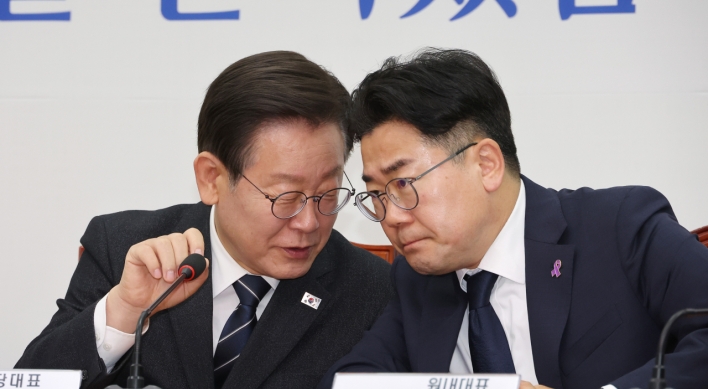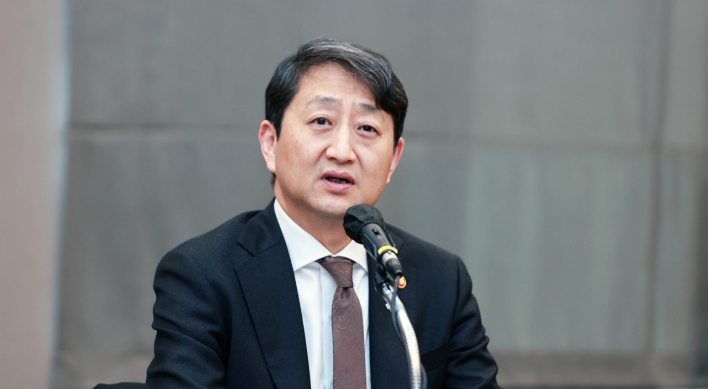[Kim Seong-kon] Takano Kazuaki’s ‘Genocide’ a page-turning novel
By Korea HeraldPublished : Feb. 11, 2014 - 19:32
Takano Kazuaki’s novel “Genocide” is a page-turner. Like Michael Bay’s fast-paced movies, Takano’s novel is so action-packed and thrilling that I could not put it down until I finished the last page. Takano’s experience studying film in L.A. and working with renowned director Kihachi Okamato has undoubtedly shaped his mesmerizing narrative technique. Indeed, the pleasure of reading “Genocide” primarily comes from its beautiful merging of literature and film; the novel manages to explore deep literary themes while swiftly shifting scenes at the same time.
 “Genocide” explores the innate prejudices of human beings against other cultures, races and religions. According to Takano, humans have an instinctive fear of those who are different from them. Unfortunately, fear begets hate, and hate at its extreme brings forth genocide. Indeed, history is full of genocides: Hitler’s Holocaust, Stalin’s Moscow Trials, Pol Pot’s Killing Fields, the Bosnian civil war and the massacre in Rwanda, to name but a few. In “Genocide,” Takano courageously adds to the list the Nanjing Massacre perpetrated by Japanese imperialist troops.
“Genocide” explores the innate prejudices of human beings against other cultures, races and religions. According to Takano, humans have an instinctive fear of those who are different from them. Unfortunately, fear begets hate, and hate at its extreme brings forth genocide. Indeed, history is full of genocides: Hitler’s Holocaust, Stalin’s Moscow Trials, Pol Pot’s Killing Fields, the Bosnian civil war and the massacre in Rwanda, to name but a few. In “Genocide,” Takano courageously adds to the list the Nanjing Massacre perpetrated by Japanese imperialist troops.
He also sharply criticizes the ungrounded prejudices of the Japanese people against Koreans and Chinese. In “Genocide,” Takano introduces a good Korean character named “Jeong-hoon,” a reliable friend of the protagonist, Koga Gento. Together, the two save dying children, overcome international crises and ultimately save the world from annihilation, against all odds. While describing Jeong-hoon, Takano makes a reference to the Korean man, Lee Soo-hyun, who sacrificed his own life while trying to save a drunken Japanese man who had fallen onto the tracks at a station in Tokyo.
In “Genocide,” pygmy parents in Africa beget a super-intelligent human-like species: a little girl and her baby brother. These siblings, though young, are far more intelligent than human beings, and capable of controlling international incidents and even altering the course of human history. They can easily hack and disrupt even the seemingly impregnable U.S. military computer network. Out of fear, the U.S. president authorizes a secret operation to eliminate the new species that he believes will threaten not only the States, but also the entire human race. It is this prejudice, fear and hatred toward the unknown that Takano powerfully criticizes in his intriguing novel.
Takano does not seem to believe in the innate goodness of human beings. In “Genocide,” he questions the view that human nature is fundamentally good. “If it is man’s nature to be good,” he writes, “why do we call it ‘virtue’ when someone does a good thing?” Indeed, if it is a normal, natural thing for a man to do a good deed, why do we praise good people? At the same time, however, Takano seems to believe that human nature is not necessarily evil, either. For example, in his novel, Takano introduces altruistic people, including the protagonist and his Korean friend, who are willing to help others and embrace different cultures, customs and religions.
Takano also powerfully indicts opinionated political leaders who authorize secret operations to eliminate others or declare war in the name of national security. He aptly points out that such inconsiderate, careless political leaders are, in fact, far removed from the front lines and thus ignorant of the atrocious outcomes of their decisions. Takano writes, “The scary thing is not the military power, but the prejudice and personality of the man who uses it.” If one considers Hitler, Stalin or Pol Pot, we know Takano is right in every sense.
At first, “Genocide” resembles Vince Flynn’s thrillers such as “Term Limits,” “Transfer of Power” and “Separation of Power,” which reportedly inspired the famous TV series “24.” Indeed, Takano’s novel begins with the White House, U.S. President and political conspiracies in Washington, D.C. Then the setting shifts to Africa and Portugal. As much as “Genocide” is a cosmopolitan novel, it is also a uniquely Japanese novel as Takano skillfully inserts inter-chapters to describe the protagonist who lives in Tokyo, all the while delineating Japanese culture and society, bridging the East and the West. In that sense, “Genocide” is an intricate architecture of words.
According to Wikipedia, genocide is “the deliberate and systematic destruction, in whole or in part, of an ethnic, racial, religious, or national group.” That means that if we fear, hate and try to eliminate those who are different from us, we are guilty of genocide. Genocide is easily perpetrated by self-righteous people who believe they are politically correct. Writing “Genocide,” Takano must have had in mind the self-righteous neo-conservatives and the Bush administration.
Unfortunately, self-righteous people are ubiquitous in Korean society as well. They can neither tolerate differences nor embrace different cultures, religions or races. They fear, hate and antagonize those who are different from them. Many Koreans do not even allow others to express different opinions. “You’re wrong!” they roar whenever they encounter different opinions, insisting, “We’re the only ones who are right.”
As Takano’s “Genocide” urges, we should learn to tolerate and embrace others. We also should learn to break the shell of egotism and prejudice, and accept differences. This is the precious lesson we can learn from Takano’s fantastic work.
By Kim Seong-kon
Kim Seong-kon is a professor of English at Seoul National University and president of the Literature Translation Institute of Korea. ― Ed.
 “Genocide” explores the innate prejudices of human beings against other cultures, races and religions. According to Takano, humans have an instinctive fear of those who are different from them. Unfortunately, fear begets hate, and hate at its extreme brings forth genocide. Indeed, history is full of genocides: Hitler’s Holocaust, Stalin’s Moscow Trials, Pol Pot’s Killing Fields, the Bosnian civil war and the massacre in Rwanda, to name but a few. In “Genocide,” Takano courageously adds to the list the Nanjing Massacre perpetrated by Japanese imperialist troops.
“Genocide” explores the innate prejudices of human beings against other cultures, races and religions. According to Takano, humans have an instinctive fear of those who are different from them. Unfortunately, fear begets hate, and hate at its extreme brings forth genocide. Indeed, history is full of genocides: Hitler’s Holocaust, Stalin’s Moscow Trials, Pol Pot’s Killing Fields, the Bosnian civil war and the massacre in Rwanda, to name but a few. In “Genocide,” Takano courageously adds to the list the Nanjing Massacre perpetrated by Japanese imperialist troops. He also sharply criticizes the ungrounded prejudices of the Japanese people against Koreans and Chinese. In “Genocide,” Takano introduces a good Korean character named “Jeong-hoon,” a reliable friend of the protagonist, Koga Gento. Together, the two save dying children, overcome international crises and ultimately save the world from annihilation, against all odds. While describing Jeong-hoon, Takano makes a reference to the Korean man, Lee Soo-hyun, who sacrificed his own life while trying to save a drunken Japanese man who had fallen onto the tracks at a station in Tokyo.
In “Genocide,” pygmy parents in Africa beget a super-intelligent human-like species: a little girl and her baby brother. These siblings, though young, are far more intelligent than human beings, and capable of controlling international incidents and even altering the course of human history. They can easily hack and disrupt even the seemingly impregnable U.S. military computer network. Out of fear, the U.S. president authorizes a secret operation to eliminate the new species that he believes will threaten not only the States, but also the entire human race. It is this prejudice, fear and hatred toward the unknown that Takano powerfully criticizes in his intriguing novel.
Takano does not seem to believe in the innate goodness of human beings. In “Genocide,” he questions the view that human nature is fundamentally good. “If it is man’s nature to be good,” he writes, “why do we call it ‘virtue’ when someone does a good thing?” Indeed, if it is a normal, natural thing for a man to do a good deed, why do we praise good people? At the same time, however, Takano seems to believe that human nature is not necessarily evil, either. For example, in his novel, Takano introduces altruistic people, including the protagonist and his Korean friend, who are willing to help others and embrace different cultures, customs and religions.
Takano also powerfully indicts opinionated political leaders who authorize secret operations to eliminate others or declare war in the name of national security. He aptly points out that such inconsiderate, careless political leaders are, in fact, far removed from the front lines and thus ignorant of the atrocious outcomes of their decisions. Takano writes, “The scary thing is not the military power, but the prejudice and personality of the man who uses it.” If one considers Hitler, Stalin or Pol Pot, we know Takano is right in every sense.
At first, “Genocide” resembles Vince Flynn’s thrillers such as “Term Limits,” “Transfer of Power” and “Separation of Power,” which reportedly inspired the famous TV series “24.” Indeed, Takano’s novel begins with the White House, U.S. President and political conspiracies in Washington, D.C. Then the setting shifts to Africa and Portugal. As much as “Genocide” is a cosmopolitan novel, it is also a uniquely Japanese novel as Takano skillfully inserts inter-chapters to describe the protagonist who lives in Tokyo, all the while delineating Japanese culture and society, bridging the East and the West. In that sense, “Genocide” is an intricate architecture of words.
According to Wikipedia, genocide is “the deliberate and systematic destruction, in whole or in part, of an ethnic, racial, religious, or national group.” That means that if we fear, hate and try to eliminate those who are different from us, we are guilty of genocide. Genocide is easily perpetrated by self-righteous people who believe they are politically correct. Writing “Genocide,” Takano must have had in mind the self-righteous neo-conservatives and the Bush administration.
Unfortunately, self-righteous people are ubiquitous in Korean society as well. They can neither tolerate differences nor embrace different cultures, religions or races. They fear, hate and antagonize those who are different from them. Many Koreans do not even allow others to express different opinions. “You’re wrong!” they roar whenever they encounter different opinions, insisting, “We’re the only ones who are right.”
As Takano’s “Genocide” urges, we should learn to tolerate and embrace others. We also should learn to break the shell of egotism and prejudice, and accept differences. This is the precious lesson we can learn from Takano’s fantastic work.
By Kim Seong-kon
Kim Seong-kon is a professor of English at Seoul National University and president of the Literature Translation Institute of Korea. ― Ed.
-
Articles by Korea Herald










![[KH Explains] Can tech firms' AI alliances take on Nvidia?](http://res.heraldm.com/phpwas/restmb_idxmake.php?idx=644&simg=/content/image/2024/05/07/20240507050619_0.jpg&u=)








